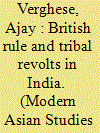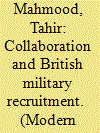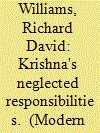|
|
|
Sort Order |
|
|
|
Items / Page
|
|
|
|
|
|
|
| Srl | Item |
| 1 |
ID:
146840


|
|
|
|
|
| Summary/Abstract |
British colonial rule in India precipitated a period of intense rebellion among the country's indigenous groups. Most tribal conflicts occurred in the British provinces, and many historians have documented how a host of colonial policies gave rise to widespread rural unrest and violence. In the post-independence period, many of the colonial-era policies that had caused revolt were not reformed, and tribal conflict continued in the form of the Naxalite insurgency. This article considers why the princely state of Bastar has continuously been a major centre of tribal conflict in India. Why has this small and remote kingdom, which never came under direct British rule, suffered so much bloodshed? Using extensive archival material, this article highlights two key findings: first, that Bastar experienced high levels of British intervention during the colonial period, which constituted the primary cause of tribal violence in the state; and second, that the post-independence Indian government has not reformed colonial policies in this region, ensuring a continuation and escalation of tribal conflict through the modern Naxalite movement.
|
|
|
|
|
|
|
|
|
|
|
|
|
|
|
|
| 2 |
ID:
146836


|
|
|
|
|
| Summary/Abstract |
This article examines the ways in which rural elite collaborators mobilized recruits for the British Army during the First World War. It thus not only increases knowledge of Punjab's military history, but adds to the understanding of collaboration as a process involving competitive groups in which elites manipulated the process for their own ends. The case study material drawn from the Shahpur district of the colonial Punjab argues that while there may have been a degree of indoctrination into the colonial state's values, it was mainly the desire to use its patronage to bolster family influence or to transform local hierarchies that was the key factor in securing willing collaborators. The competition for local power and influence provided a local dynamic to the collaborative process. The state could of course take advantage of this competition to serve its interests, just as the Punjabi tribal chiefs could utilize state patronage to beat off rivals to their power. Collaboration was thus a dynamic two-way process, rather than, as it is often portrayed, a top-down, one-way relationship.
|
|
|
|
|
|
|
|
|
|
|
|
|
|
|
|
| 3 |
ID:
146837


|
|
|
|
|
| Summary/Abstract |
The paucity of sources documenting the role of Indians in the nineteenth-century British imperial engagement with Afghanistan has resulted in significant lacunae within later cultural artefacts documenting the period. The South Asians who formed the bulk of British expeditionary forces in the first Anglo-Afghan war (1837–1842) were, however, indispensable as cultural intermediaries, translating little-studied Afghan languages into patterns of South Asian speech that had become familiar to colonial officials through a gradual and ongoing process of exposure in India proper and, in the presence of comprador agents, beyond. For English-language authors writing in the aftermath of the traumatic retreat of the British army from Afghanistan in 1842, British India and its subject populations provided a convenient and long-established set of topoi through which to produce convincingly authentic representations of Afghanistan as an exotic and alien ‘mythic space’. Following George Steiner and Richard Slotkin, this article argues that the narrative memorials to the first Anglo-Afghan War become possible only through the activation of a particular set of stable, yet portable, South Asian literary figures which stand in for Afghanistan itself.
|
|
|
|
|
|
|
|
|
|
|
|
|
|
|
|
| 4 |
ID:
146839


|
|
|
|
|
| Summary/Abstract |
In the last century the French presented their race-neutral policies as evidence of their colour blindness. Yet they were among the foremost proponents of race theory and racial hierarchy, which propelled the colonial machine of the nineteenth century. This article examines the role of French academics in creating a position for India in the racial imagination for the first time in history. It examines the motivations behind such a focus on India and the resulting response from Britain, the colonial ruler. The works of Paul Topinard, Louis Rousselet, Arthur Gobineau, and Gustave le Bon are situated in the colonial and political context of the mid-nineteenth century to demonstrate not only that it was the French, and not the Germans, who placed India on an Aryan pedestal, but that this move was propelled by the dream of an unfulfilled French empire in India.
|
|
|
|
|
|
|
|
|
|
|
|
|
|
|
|
| 5 |
ID:
146842


|
|
|
|
|
| Summary/Abstract |
This article deals with the relationships Japan has built in the Asia-Pacific region in the aftermath of decolonization. In post-war historic studies, the emphasis has been on issues such as paying reparations and providing economic assistance as Japan's means of rising to become a world power, at least from an economic point of view. The article explores, from a historical perspective, Japan's efforts with regard to development aid, but focuses on its transition to taking a more active role in Asia. This became more evident from the mid-1970s, when some crucial events related to the Cold War altered the the balance of power in the world. Hence, it investigates how Japan faced and took advantage of the situation in this area, and how it modified its approach to providing foreign assistance to Southeast Asia. Finally, it meditates upon the meaning of the Fukuda Doctrine as an enhancement of Tokyo's regional policy.
|
|
|
|
|
|
|
|
|
|
|
|
|
|
|
|
| 6 |
ID:
146834


|
|
|
|
|
| Summary/Abstract |
This article examines the literary strategies employed by a devotional poet who wrote about recent events in the eighteenth century, in order to shed light on contemporary notions of social responsibility. Taking the poetic treatment of Ahmad Shah Abdali's invasion of North India and the sacking of Vrindavan in 1757 as its primary focus, the article will discuss how political and theological understandings of lordship converged at a popular level, such that a deity could be called to account as a neglectful landlord as well as venerated in a bhakti context. It examines the redaction of tropes inherited from both vaisnava literature and late Mughal ethical thought, and considers the parallels between the Harikala Beli, a Braj Bhasha poem, and immediately contemporary developments in Urdu literature, particularly the shahr ashob genre. As such, it uses poetic responses to traumatic events as a guide to the interaction between multiple intellectual systems concerned with human and divine expectations and obligations.
|
|
|
|
|
|
|
|
|
|
|
|
|
|
|
|
| 7 |
ID:
146841


|
|
|
|
|
| Summary/Abstract |
In January 1950, Jawaharlal Nehru wrote to Liaquat Ali Khan, seeking a joint declaration of a No War Pact by the governments of India and Pakistan. The two prime ministers undertook a lengthy correspondence on this subject, spanning a year that saw rising levels of resentment and hostility between the two countries. Yet, as the inter-dominion correspondence on the No War declaration during this period shows, neither government was actually predisposed to take a belligerent position and critically engaged with the possibility of signing a declaration that renounced the use of war. As I hope to show through my discussion of the ‘No War Pact’ correspondence, relations between India and Pakistan were not necessarily confined to hostile exchanges, and both governments also repeatedly engaged with each other to attempt to find spaces of agreement and compromise. Although much of the existing literature on India–Pakistan relations characterizes it as locked in acrimony and conflict, which arose from the bitterness of partition, a closer scrutiny reveals a more nuanced picture. Attempts at cooperation and dialogue between the two governments—and the rationale for undertaking them—complicate our understanding of a relationship apparently limited to instinctive antagonism, and help in creating a more rounded picture of the India–Pakistan dynamic.
|
|
|
|
|
|
|
|
|
|
|
|
|
|
|
|
| 8 |
ID:
146843


|
|
|
|
|
| Summary/Abstract |
Exploring how the history of the Fifteen-year War was dealt with in pre-1982 mainland China is an essential step towards understanding the currently explosive Sino-Japanese History Problem; furthermore, this might shed light on various issues in the post-war history of China and Sino-Japanese relations. However, available research on the pre-1982 period is scarce and problematic. Earlier political scientists argue that the history of the war was ruthlessly manipulated by the Chinese Communist Party regime, while some recent studies believe that the war was conveniently ‘forgotten’ as Sino-Japanese friendship was vital for the government of the People's Republic of China. This article aims at providing an accurate and thorough picture of how the history of the Fifteen-year War was positioned in the diplomatic practice of the Chinese Communist Party regime in relation to Japan during the period.
|
|
|
|
|
|
|
|
|
|
|
|
|
|
|
|
| 9 |
ID:
146838


|
|
|
|
|
| Summary/Abstract |
This article explores ideas of belonging that gained prominence among Indian Tamils in interwar British Malaya by revisiting a transnational dialogue that has been under-represented in the community's history. Through an analysis of the developments that unfolded during and in the decade following Periyar E. V. Ramasamy's first visit to Malaya in 1929, it positions the diaspora within the politics of a reform movement that had a profound impact on Tamil cultural and political consciousness in two colonial societies. Having originated in the former Madras Presidency, the Self-Respect movement entered Malaya at a time when both societies were engulfed in momentous change. Led by the middle class, the movement's subsequent ‘Malayanization’ raised salient questions of political allegiance as it was adapted, challenged, and ultimately reapplied to India in the interest of defending the Tamil homeland. Through an analysis of the contentious loyalties that Malayan Self-Respecters encouraged, and the responses that surfaced in the process, this article will demonstrate that the movement opened up critical new discursive spaces through which the diaspora engaged with its ‘home’ and ‘host’ societies.
|
|
|
|
|
|
|
|
|
|
|
|
|
|
|
|
| 10 |
ID:
146835


|
|
|
|
|
| Summary/Abstract |
Literary journals and newspapers aiming to reform the religious beliefs and domestic habits of women were common in early twentieth-century North India. Although most readings have focused on how these texts reflected male legislation of women's behaviour, we should look at Muslim reformist literature to understand male experiences; this investigation offers new insights into an emergent middle-class identity defined more by manners than birth. Readings of a previously little-researched Urdu newspaper, Madinah, and its women's section offer new insights on male experiences of reformism, characterized by profound ambivalence. Playfulness emerged in some reformist descriptions of women's voices, channelling the influence of rekhti. Ultimately Madinah cultivated pride in Islam's strict division of gender roles and conversely threatened men with shame for failing to regulate uneducated women. Descriptions of powerful, Ottoman women warriors were framed to incite men to acts of bravery, using reports from Europe as cautionary examples of the over-indulgence of women. While the newspaper offered outlets for men to express curiosity about women's experiences, ultimately reformist literature limited expressions of pleasure. Male ambivalence regarding the implications of the reformist project remained embedded in writing about women.
|
|
|
|
|
|
|
|
|
|
|
|
|
|
|
|
|
|
|
|
|